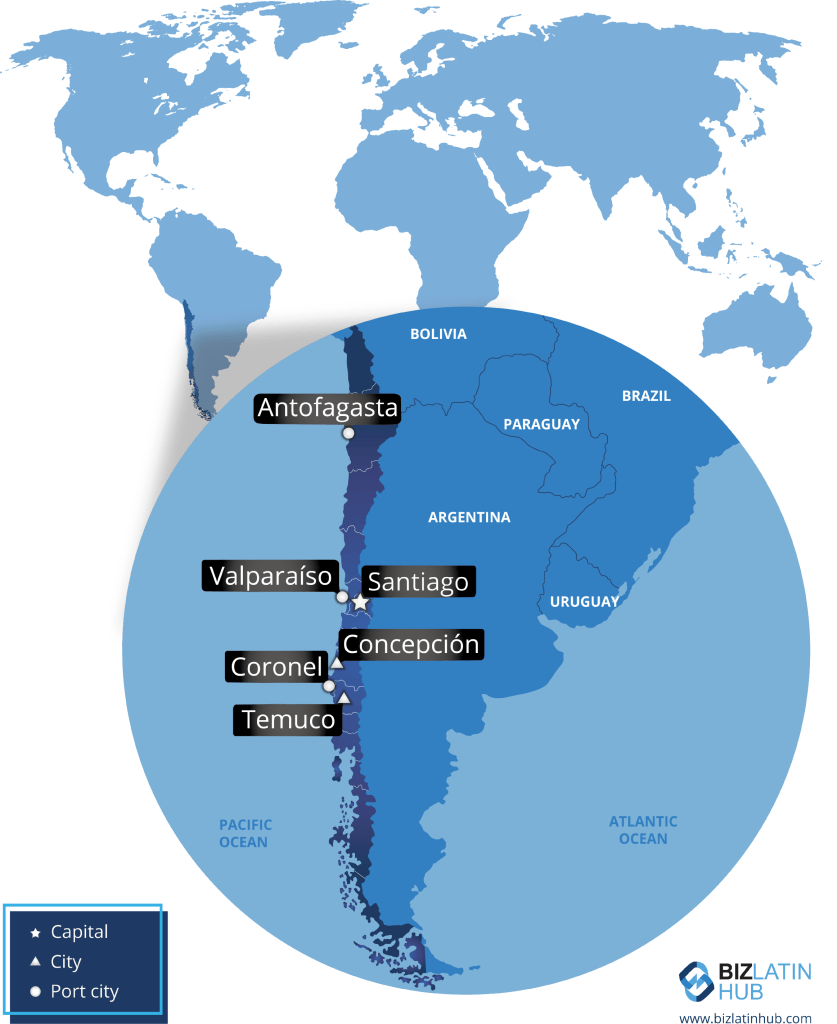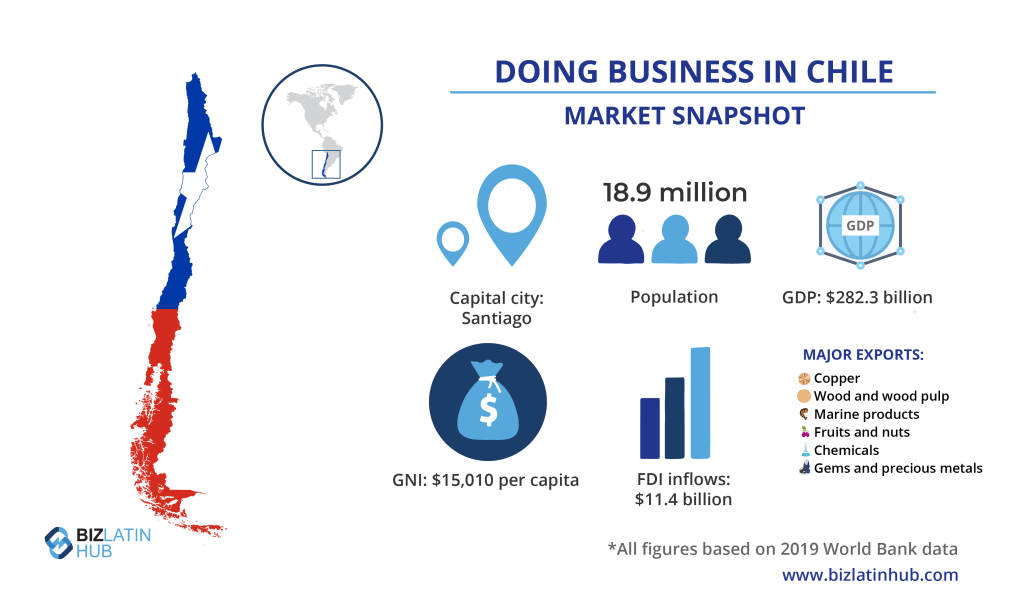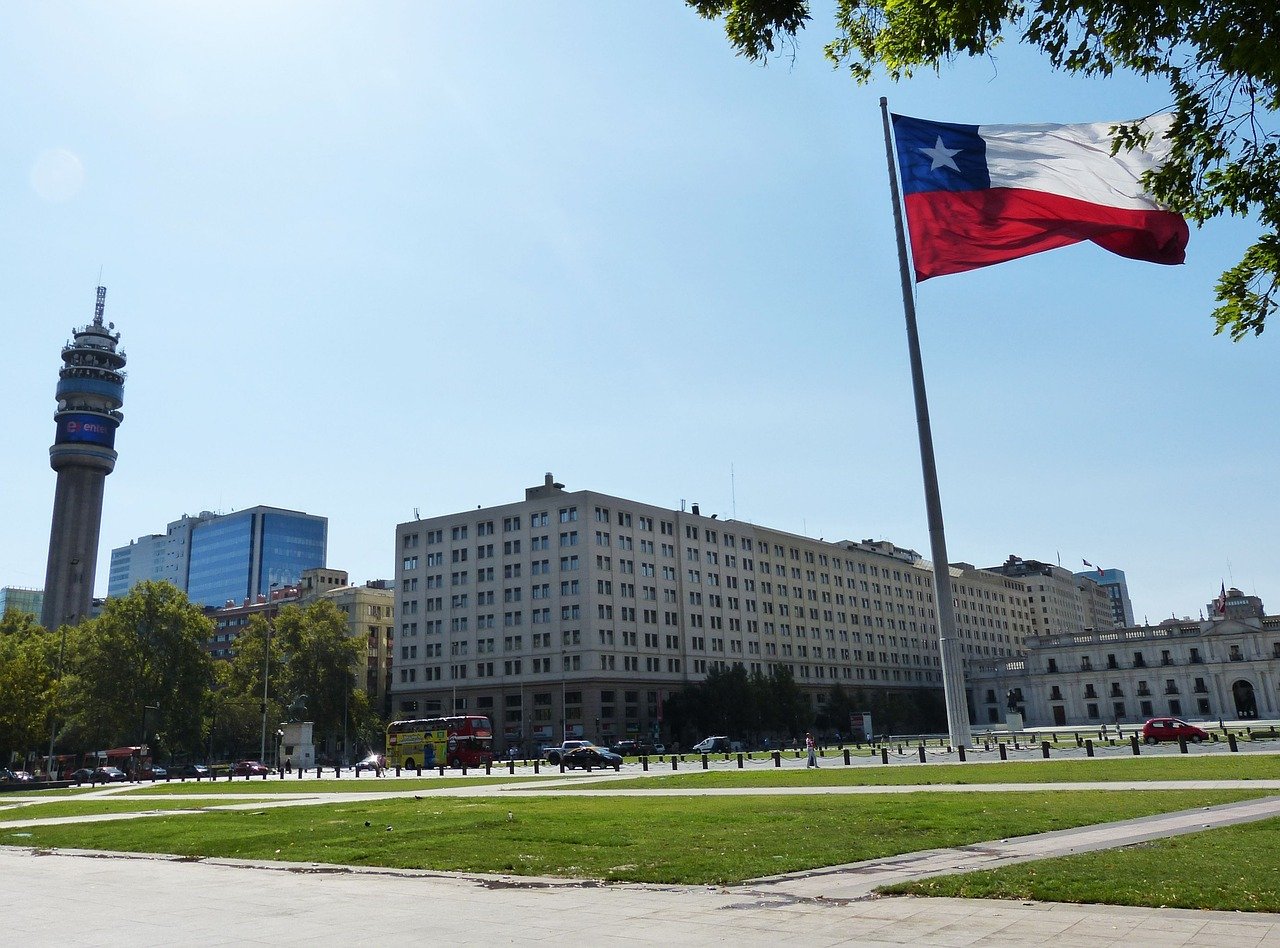
Historically, Chile has always been a strong trading partner. With its long coastline and multitude of ports, Chile lends itself perfectly to maritime trade. More recently, however, the country has built an economy known to be favorable to foreign companies, thanks in particular to its business-friendly regulatory system. The combination of its trading expertise, free trade agreements in Chile, and strong business environment has allowed its government to establish strong relations with other nations around the world and hence develop international trade.
Since the 1990s, Chile has been in the process of internationalizing its economy. The signing of the free trade agreement with Canada in 1997 and an economic partnership agreement with Mercosur in 1996 initialized Chile’s efforts to expand. Considered a leader in South America in terms of competitiveness, digital technology, and maritime trade expertise, Chile has a global vision of trade. Before incorporating a company in Chile, it is worth looking into the favorable agreements that Chile has been able to sign over the years.
Between 1989 and 2019, Chile’s gross domestic product (GDP) grew from under $30 billion to more than $280 billion (all figures in USD), while gross national income (GNI) — a general indicator of general prosperity — had risen to $15,010 at the end of that period, placing Chile as a high-income nation according to international standards.
Chile’s pro-business outlook and status as a free trade hub attract considerable foreign direct investment (FDI) to the country, with FDI inflows hitting $11.4 billion in 2019. Chile is also known to be particularly active in promoting startups and innovation, with government-run incubator Startup Chile branded “revolutionary” by Forbes magazine.
Read on to get to know Chile’s free trade agreements closer and how you can take advantage of them. Or go ahead and contact us now.

Chile’s Trade Facilitation Agreement with the World Trade Organization
The World Trade Organization (WTO) is the world’s largest trade organization. Chile had been a member of the WTO since its creation in January 1995. The organization governs the main rules of trade between countries. These agreements, ratified by the WTO have been incorporated into Chilean domestic law. Chile is one of the 70 largest trading economies in the world. On 21 November 2016, Chile signed the Trade Facilitation Agreement (TFA), which entered into force on 22 February 2017, which proves to all global actors that the country is open and requires international trade. The TFA is an agreement that aims to reduce and simplify trade through a review of administrative formalities.
Chile’s Free Trade Agreements – MERCOSUR
Since 1996 Chile has had an economic complement agreement with the MERCOSUR alliance. This Alliance is composed of four Latin American countries: Argentina, Brazil, Paraguay, and Uruguay. It is an alliance that was created in 1991 to create a free trade area between its members. So since October 1996, Chile under this Alliance has acted as a privileged partner. The purpose of the agreement is to promote production, investment, and facilitate economic exchanges between member countries and Chile. Furthermore, Chile acts as an external consultant in the event of a significant decision for the Alliance.
Free trade agreements in Chile with North American countries
As Chile’s second-largest trading partner, the United States has a robust Free Trade Agreement (FTA). This agreement has facilitated trade between the two countries since its entry into force at the beginning of 2004. The agreement opens up markets by reducing tariffs between the two countries. Not only that, but it also reduces potential trade barriers for services. By protecting intellectual property and implementing anti-competitive legislation, services in both countries coordinate and harmonize with each other.
Canada
The original 1997 free trade agreement was updated in February 2019. The new Canada-Chile Free Trade Agreement (CCFTA) will promote an open, more inclusive, and progressive trading platform based on rules that are more relevant to today’s world. Bilateral merchandise trade between the two countries reached US$ 2.9 billion in 2019. Chile is the leading destination for foreign direct investment by Canadian investors, with almost US$ 17 trillion worth of FDI coming into Chile from Canada in 2017.
Mexico
An FTA has been in place between Mexico and Chile since 1999. This agreement comprehensively covers a wide range of sectors and markets. Both Chile and Mexico share a similar economic vision. Both nations are open to international markets and both are integrated with others economic alliances. The agreement has increased trade between the two countries by 193% since 1999, helping Chile to become Mexico’s third-largest trading partner and second-largest supplier of goods.
Chile’s free trade agreements in Latin America and the Pacific
In 1998, Chile signed an agreement to create several bilateral free trade agreements with various Central American countries, including Costa Rica, El Salvador, Guatemala, Honduras, and Nicaragua.
These agreements are of great importance for the Chilean economy as they facilitate trade between Chilean companies and this prospering region of Latin America. In the region, Chile also has an FTA with Panama, which entered into force in 2008. The agreement provides for several areas of improvement for the relationship between the two countries. In particular, the agreement created a healthier environment for trade in goods and services. But it also plans to improve competitiveness by improving, among other things, intellectual property protection, sustainability, and labor protection. This agreement allowed Chile to import US$66.7 million from Panama and export roughly US$228 million in 2017.
South America
Being a South American country itself, most of Chile’s trade is conducted with its near neighbours. The main objective of these agreements is to reduce or eliminate customs duties between Chile and the various countries in the region. Chile, therefore, has free trade agreements with four of its close neighbors: Peru (2009), Colombia (2009), Argentina (2019), and, most recently, Uruguay signed in 2016.
In addition to these FTAs, Chile has signed Preferential Trade Agreements (PTAs) with three South American countries making them the preferred partner for transactions in the region. The countries included are Ecuador, Venezuela, and Bolivia.
Chile’s free trade agreement with Australia
The Chile-Australia FTA, which came into force in March 2009, aims to boost trade relations between the two countries, making Chile the gateway for Australian products to Latin America. From the beginning of 2015, all customs duties were eliminated, with the exception of sugar. This agreement has considerably boosted development for the 200 Australian companies operating in Chile. Furthermore, many of these companies then expanded further into other Latin American countries.
The agreement allows greater investment flexibility for investors from both countries, but also makes everything related to intellectual property law, including innovation patents, more transparent.
Pacific Alliance
As a founding member of the Pacific Alliance trade bloc, Chile has used the agreement to develop its trade relations with key players in the region, each of whom has a coastline with the Pacific. The purpose of this agreement is a better collaboration, integration between its member countries to develop the economy of each of its members. The other members of this agreement are Colombia, Peru, and Mexico. This agreement creates a healthier and more competitive business environment for companies in member countries.
The Pacific Alliance is increasingly trying to form new agreements with other Pacific or Asian countries. In particular, the members of the Alliance are negotiating a new deal with New Zealand, to consolidate their already strong relationship. The Alliance exported US$ 277 million worth of goods and services to New Zealand in 2018 and imported US$ 455 million worth. Also, a new free trade agreement has been under negotiation with Australia since June 30th, 2018, the purpose of which is to strengthen relations between Alliance members and Australia, which traded nearly US$ 4 billion worth of goods in 2016. And finally, we can add an agreement with the Association of Southeast Asian Nations (ASEAN), which is about to become a reality with the 6th meeting that took place between the protagonists on September 28th 2019. These trade agreements all pose exciting and prosperous opportunities for Chile and the rest of the Pacific Alliance.
Comprehensive and Progressive Agreement for Trans-Pacific Partnership (CPTPP/TIPAT)
The CPTPP/TIPAT is a new FTA in which Chile is participating that will connect most countries experiencing sustained growth in the Pacific and Asia region. The agreement brings together ten countries in addition to Chile, including Australia, Brunei, Canada, Japan, Malaysia, Mexico, New Zealand, Peru, Singapore, and Vietnam. Such an agreement aims to create a more stable working climate between countries, but above all, to normalize production, industries, and products. The agreement was signed in March, 2018, but has not yet entered into force. According to market experts, the agreement should be in place by the end of the year.
Chile’s free trade agreements with the European Union (EU)
Since its entry into force in 2003, the free trade agreement between Europe and Chile has brought many benefits to companies in both regions. In particular, this agreement:

- removes certain tariffs
- removes a number of barriers to trade
- guarantees the protection of intellectual property
14% of Chile’s exports go to the EU, making it the country’s third-largest trading partner after the United States and China. Such a free trade agreement can only be an advantage for Chilean exporters seeking to join European markets.
it is worth noting that Chile also has an FTA with Turkey, a country with strategic positioning between the European, African, and Asian continents. This Turco-Chilean agreement came into force in March 2011, offering further opportunities to players in both markets and beyond.
Exception: United Kingdom
Since the announcement of its exit from the EU, the United Kingdom has been seeking a new agreement with a number of other countries. It is, therefore, for this reason that Chile and the UK agreed on a new trade agreement in January 2019. This agreement will use the terms that Chile has with the EU to continue the already strong agreement between Chile and the UK. The two nations have excellent commercial relations with large commercial exchanges, particularly in wines and gas turbines. Chile imported US$ 791 million from the United Kingdom in 2018 and exported US$ 771 million. With trade increasing almost 9% per year between the two trade powers, it is difficult to see the relationship deteriorating any time soon.
Chile’s free trade agreement with China
Chile’s free trade agreement with China was established in 2006, and is now the country’s largest trading partner. The agreement accounted for nearly 25% of exports and imports from Chile in 2017. The agreement saw a turning point when, in 2007, 37% of Chilean export types to China received immediate tariff relief.
This agreement was particularly significant because it was the first agreement that the Chinese government signed outside the ASEAN bloc, making it the first diplomatic relationship China embarked upon with Latin America. Furthermore, to support this good relationship, Chile was one of the first countries to recognize the Chinese economy as a market economy, driven by businesses rather than the government.
The FTA allows Chile to receive, in addition to significant tariff reductions on more than 1900 products, privileged access to a market of more than 1.3 billion people. From the first year of the agreement, Chilean exports doubled to the Chinese giant, finally reaching US$ 24.5 billion (32.5% of total Chilean exports) in 2018.
Why invest in Chile?
In addition to being one of the most prosperous countries in Latin America, Chile is considered a model of political and financial transparency in the region. Its GDP has been steadily increasing over recent years, reaching a record 4% growth rate in 2018. The country offers a fortified legal system, a low level of investment volatility, and a high-quality level of trading infrastructure. Chile also boasts the most business-friendly economy in Latin America and consequently continues to attract foreign investors.
Partner with Biz Latin Hub to exploit the free trade agreements in Chile
Chile offers you legal comfort, a booming economy, and a low-risk rate. All this is accompanied by many robust free trade agreements with the leading global players but also with evolving economies, as demonstrated by the most recent PWFC agreement signed. But before incorporating your company in Chile, you will need to be accompanied by a local expert. Because if you want to exploit the free trade agreements in Chile, you will want to have as less problems as possible.
At Biz Latin Hub, we offer a complete range of business services to facilitate your market entry as well as the back-office service support you need. Contact our team of expert lawyers and accountants to get your Chilean venture underway. Contact us now.
Learn more about our team and expert authors.






